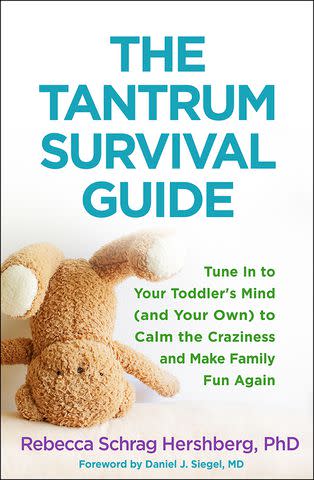12 Tips for Surviving a Trip to the Store with Toddlers
You might dread having to bring your toddler to the grocery store, but you can avoid a tantrum or meltdown with these tips to help keep your child engaged through check out.

As a parent, is anything more terrifying than taking little kids along on a shopping trip to a big box store or supermarket? The toy aisle, the checkout line candy, the impossible-to-maneuver car carts—it's exhausting to even think about, and enough to make you order pizza for dinner…again.
But sometimes, shopping with your toddler in tow is simply unavoidable. And while it will probably never be an enjoyable experience, there are ways to head a retail-induced meltdown off at the pass. Keep reading for 12 tips on how to make a shopping experience with your toddler smooth sailing.
Related:14 Temper Tantrum Tricks from Real Parents
Before You Go Shopping
Before you even grab your keys and shopping list to embark on your big adventure, it is vital to do a little bit of prep work to ensure that the experience is a peaceful one. Here are a few tips to keep in mind.
Anticipate and assess
Before you go somewhere, think about whether it might be a tricky setting for your child. What will the experience be like for them concerning temptation level and sensory input? Will there be lots of rules she needs to follow?
Remember, there is a chain of events leading up to every tantrum, offering multiple points for intervention or prevention. If you anticipate the specific challenges that your child will likely face (for example, the display of cupcakes in the bakery aisle), you might be able to stop their tantrum before it starts.
Related:9 Ways to Prevent a Meltdown—Your Kid's and Yours, Too
Build in a reward
Contrary to what you may think, it's OK to build a reward into a shopping trip, so long as the expectations around it are clear: "If you stay next to me and use your inside voice the whole time we're at the supermarket, you can pick out a treat on our way out. If I need to give you more than two warnings, we won't be able to do that."
Remember, the distinction between a reward and a bribe is important: a reward is promised in advance, before the possible negative behavior; this way, you are not unintentionally reinforcing that behavior. On the other hand, a bribe occurs once the unwanted behavior (like a tantrum) has begun and sends the message that yelling/screaming/crying can be effective in getting the thing you want.
Related:4 Ways to Stop Bribing Your Kids
Don't squeeze in one last thing
I don't care how badly you need new lightbulbs. Your family will function better by candlelight than you will if you schlep your preschooler to the drugstore right before dinner after a packed afternoon. It's better to cut something off your to-do list for the day than try to do too much and inevitably end up having a nightmare "last stop."
Related:10 Biggest Discipline Mistakes You're Probably Making
Modern technology for the win (sometimes)
If you live in an area where it's possible and a financially feasible option for your family, don't be afraid to make life easier by relying on the wonders of the Internet and ordering what you need online.
However, I don't recommend you do this every time you run out of paper towels or breakfast cereal; we can't model (and therefore teach) that avoidance is always possible or preferable.
We raise resilient children with good coping skills by letting them have frustrating and overwhelming experiences and by showing them that they can get through it.
Become a team with your child
This piece is so, so important. Your child does best when they feel like you "get" them, and this is doubly true in tricky settings. Your child needs to know that you are there for them, rather than just waiting for the proverbial $#%* to hit the fan.
One way to help ensure that you approach things as a team is to give your shopping trip a name that evokes fun and positivity (Mommy and Aaron's Adventure in Costco, Jonas's Journey to the Supermarket). Feel free to get into it—come up with a song or cheer you can sing as you go.
Related:How NOT to Deal with Your Toddler's Meltdown
Once You're At the Store
OK, so you've done your prep work, and you're all in the right frame of mind to make this trip to the grocery store a success. But what happens once you get there? What if your toddler starts to throw a temper tantrum? Here are some ideas to keep the calm.
Engage your child
It sounds simple because it is, at least in theory. A tricky setting is a great place to talk to your little one about their interests. Make sure to be specific and ask your child to tell you their favorite joke again, or about the episode of Paw Patrol they watched over the weekend, or about what they want to be for Halloween next year (they ALWAYS know!).
If your toddler needs some distraction, play a fun "I Spy" game and work on colors, numbers, letters, and objects like different kinds of fruits or vegetables. Your child will have fun and learn something new while you get your shopping done,
Play a game of "I bet…"
Toddlers and preschoolers go nuts when you "bet" they can't do something; they rise to the challenge almost every time. Try these:
"I bet you can't do the hokey pokey all the way down this aisle."
"I bet you don't know what color this is (point to something)."
"I bet you can't count everything in our cart so far."
"I bet you can't name everyone in this room."
Related:21 Fun Games to Play in the Car
Give your child jobs
To the extent that your child feels like your helper—and ideally really embraces this role—they most likely won't have a tantrum.
Have your child help you get things off the shelf, put things in the cart, or place items in shopping bags. If no immediate jobs come to mind, make one up. I recently asked my son to "help" me figure out how many hair elastics I had in my bag.
Related:How to Respond When Your Kid Gives You Attitude
Don't push it
Remember: leaving is an option. If it feels like you’re skating on thin ice with your toddler's ability to hold it together, it's OK to abandon ship (and your shopping cart). If you do leave before you intended, either before or during a meltdown, this is not a failure—either on you part or that of your little one.
Children and parents aren't perfect, and there is nothing like a family trip to the mall to make that abundantly clear.
Related:The Top Spots Where Kids Have Tantrums and How to Avoid Them
On Your Way Home
You made it through the hard part! Hopefully, your child was able to remain calm, and you didn't forget anything on your list. But there is still one more leg of this trip: getting home. Keep reading for tips on how to keep the peace until you get home.
Pat yourself (and your little one) on the back
Really. You (both) did it. No matter how it went. If it didn't go as well as you might have hoped, take the opportunity to reflect. Think about what you might do differently next time—without beating yourself up—and do something to reestablish the connection between you and your child.
Let your child know how great they did, and be specific. Try saying things like:
"I noticed how great you did staying calm while we were in line."
"Thank you for joining me on our errands today; you were so polite and helpful!"
"I know you felt upset about not getting that candy, but I am really proud of how well you handled yourself!"
Related:6 Ways to Upgrade Your Praise
Make good on any rewards you may have promised
That is, presuming your child held up their end of the bargain.
Exhale
Take a deep breathe and remember, no matter how frustrating or exhausting it is taking little kids out in public, every single trip is an excellent opportunity for you to practice patience and your child to learn social skills.


Rebecca Schrag Hershberg, Ph.D., is the author of The Tantrum Survival Guide and the founder of Little House Calls Psychological Services.
Excerpted from The Tantrum Survival Guide by Rebecca Schrag Hershberg, Ph.D. Copyright (c) 2019 The Guilford Press. Reprinted with permission from The Guilford Press.

